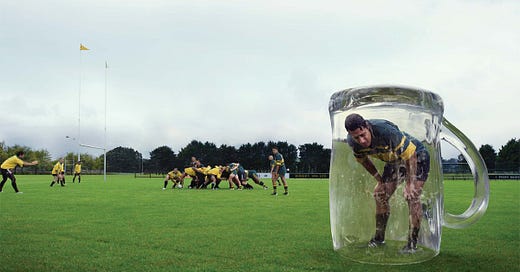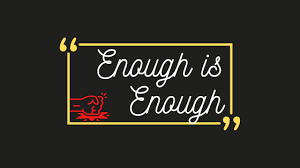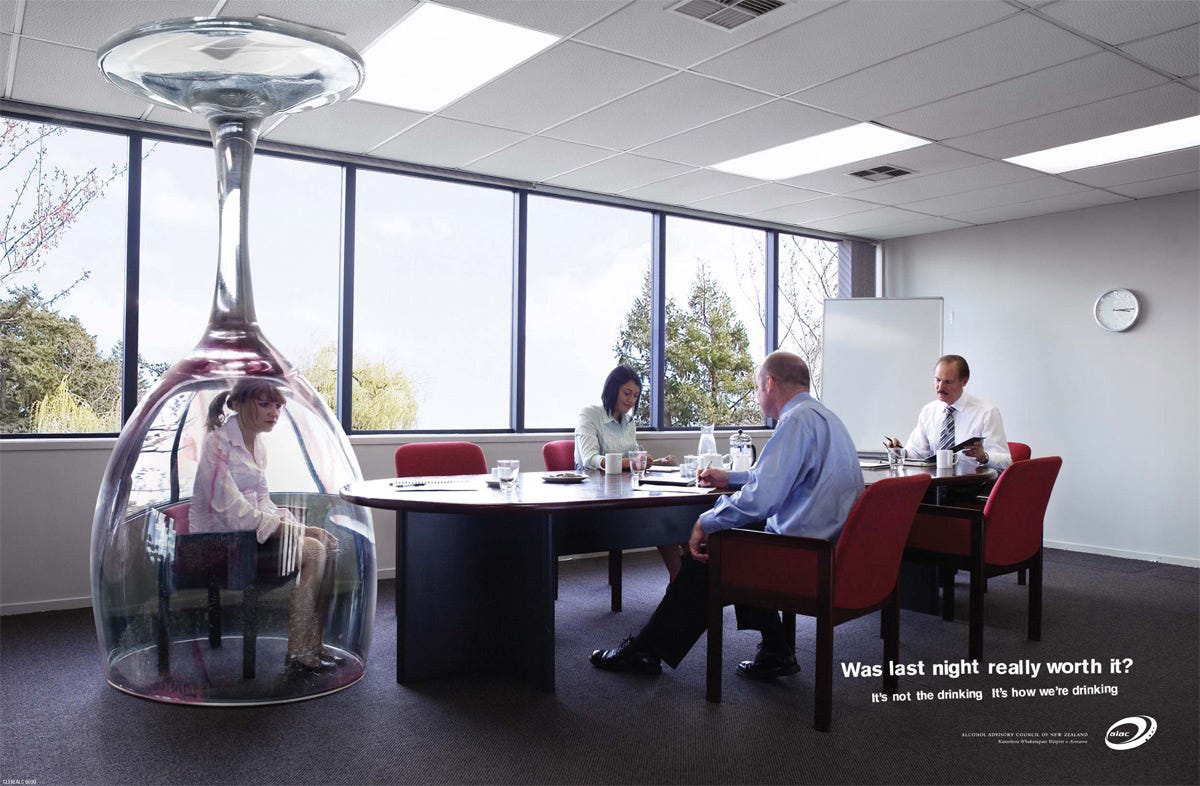Growing up in Aotearoa aka New Zealand there was a lot of great social common sense TV advertising from the Goverment to help citizens live a healthy and productive life. We had Len Ring teaching us how to lift safely by keeping a straight back and telling us to stop bending over and using your back like a crane. Too many Kiwis were doing their backs and popping up on the health budget and ACC (Accident Compensation Commission) books for unsafe lifts so the way we combat the crime was with a common sense ad to tell us how to lift safely.
The ads didn’t stop with how to lift weight safely and look after your back. We had imported ads like the one where Dick Van Dyke used to say - what do you do when you catch fire? Stop, drop and roll Dick roll….clearly a few Kiwis were standing a bit close to the open fire and going up in their polyester pjamas and causing unnecessary grief for their loved ones and the hospital system.
We also had a great series of campaigns targeting enthusiastic beer drinkers at the pub that went “learn how to say when” enough is enough. Some blokes talking in the hotel bathroom about money problems and wishing for a better tomorrow. A friend having a chat with another friend at her workplace about her drinking too much. They were impactful and help a lot of people become aware that is not the drinking but how we are drinking that is the problem and that it is time to moderate their drinking. Some links to some of the great TV and Print ads below:
1987 ALAC “Say When” TV Commercial
2010 ALAC 'Ease Up On The Drink Kat' TV commercial
We all know that we are not perfect and sometimes some gentle words of reminder or encouragment from social adertising and a word from friends and loved ones can help get us back on the right path. We have seen very effective campaigns on a number of alcohol related issues including drink driving and behaviours have moderated and changed for the overall better health and wellbeing of everyone in society.
Education and awareness of the dangers of drinking alcohol are more widely seen and known and there is an abundance of public media and social media information from health authorities and influencers sharing their stories about alcohol. The trend for younger adults is towards moderation and more young adults are chosing to not consume alcohol for health and other reasons.
What I want to know is when did the right intentions to change behaviour change to the wrong intentions or unintended consequences of clearly misdirected alcohol excise taxes. Alcohol Excise Taxes are sin taxes and are often introduced by Governments with the best intentions but rapidly become simple revenue raises that land in the general revenue bucket for government with little going towards the actual “sin” or reason for the tax in the first place. The natural consequence is the Government rachets up the “sin tax” to fill their coffers and over time forgets the original intention of the tax in the first place and simply sees it as another easy way to raise revenue.
I would argue that today in modern Australia, most reasonable adults aged 18 years and over are well aware of the physical, emotional and social harms of alcohol, especially when consumed to excess. However, when did it become socially acceptable to tax alcohol beyond the point of any reasonableness and introduce bi-annual escalator excise increases that are indexed to inflation? Australia is now the third highest alcohol taxed country in the world behind only Finland and Norway. This is a bronze medal at the wrong end of the leaderboard in my mind and the minds of many moderate drinkers and people who work in the alcohol industry.
Health advocates would suggest the excise taxes are working and that the steadily dropping level of per capita alcohol consumption in Australia is evidence that the excise taxes are working. See the graph demonstrating a steady decline in consumption of alcohol over the past several decades.
When Australia taxes alcohol to the point of unaffordability for average income ordinary working class Aussies, where do they go and what do they do to relax? Its not a far fetched argument to suggest that young adults looking for an affordable “buzz” before going out to party with their mates might take some “illicit substances” with all the known and unknown harms that they bring. We are certainly seeing the data show a rapid rise in illicit stimulant use in Australia at the same time alcohol consumption is dropping.
In July 2024, the Australian Criminal Intelligence Commission (ACIC) released its latest findings from the National Wastewater Drug Monitoring Program. A segment of the report updates directly comparable data from the 2023 Sewage Core Group Europe (SCORE), which covers 112 cities across 34 countries in Europe, Asia, North and South America and Oceania. The data reaffirm the pronounced preference in world terms for illicit stimulants among Australian drug consumers, with Australia ranking 4 out of 34 participating nations. The findings further underscore the prevalence of methylamphetamine in the national stimulant market, with Australia recording the second-highest per capita consumption of methylamphetamine compared to 29 other countries. Australia also ranked 20th of 32 countries for cocaine consumption, 15th of 33 countries for MDMA consumption and third of 20 countries for cannabis consumption.
Note: Methamphetamine and amphetamine, and pharmaceutical stimulants, were included in the survey for the first time in 2022–2023.
Source: NDSHS 2022–2023, Table 5.6.
There are many obvious social harms from the use of illicit stimulants by Austrlians. Firstly, you fuel criminal syndicates. Secondly, you put young adults lives at risk taking substances that are often medically unsafe made in unlicenced and unregulated manufacturing facilities . Thirdly, you risk addiction to highly addictive substances that can rip through users savings, destroy their relationships, and cause physical and emotional and mental health issues.
The National Drug Strategy Household Survey released in February 2024 showed increased consumption of drugs and vaping while showing declining risky drinking behaviours for people aged 14 and over (see figure 5 below):
Figure 5: Risky drinking behaviours, people aged 14 and over, 2007 to 2022–2023
Source: NDSHS 2022–2023, Table 4.27.
Recent government and media reports are clearly indicating Australia has a serious drug problem - not a serious alcohol problem. The question we need to ask ourselves is to what degree is our current hihgly punitive alcohol excise tax with bi-annual escalator increases having in terms of unintended social consequences? Is it a reasonable assumption to make that increased alcohol excise tax creates increased illicit stimulant deamand as adults seek affordable substitutes for alcohol before or during a night out on the town, or in their own homes?
Personally, I feel the time has come to call time on Alcohol Excise Tax. We have an overly complex and unbalanced alcohol excise system that favours certain alcoholic beverages most specifically wine over other types of alcohol like beer and spirits. The excise tax is unfairly distributed and is overly complex and requires a complete overhaul or I would argue abloshment. With increased medical knowledge and education and awareness of the potential health harms of alcohol and clear signs of a society that is enjoying more responsibly now we can argue that there is no need for these economic levers to be used by government.
The alcohol industry is regulated and taxed and directly supports employment of 176,000 full time equivalent jobs (FTEs), or 238,000 employees. Total economic contribution of the alcohol beverages industry was $52 billion in total value add and 484,900 jobs in 2018-19. Every person employed in the Australian alcohol beverages industry supports another employed person (Deloitte Access Economics, 2021).
The alcohol beverages industry supports a diverse workforce and plays an important role in supporting younger workers. Around 55% of the workforce is aged below 35, higher than the national average of 37%. The representation of female workers is mixed across the industry. Just under 50% of industry employees are women (Deloitte Access Economics, 2021).
Australia is spoilt for resources beyond simply mining and energy which often steal the limelight for Australia’s biggest export earners. Our agricultural resources are vaste and we are unique in having almost all the raw materials abundantly available to make global award winning wines, beers and spirits of all variety. Why, would we use indirect taxes like Alcohol Excise Tax applied discriminatory with overly punitive measures to dampen a potential export industry. In order for small winemakers, brewers and distillers to grow into medium and one day large global winemakers, brewers and distillers we need to have a vibrant domestic industry unimpeded by excessive alcohol excise taxes. Our multicultural society is the opportune melting pot of nationalities and cultures to test new beverages and in order to compete globally we need to be strong at home before we export.
The alcohol industry pays all the same taxes every other legal industry pay and it employs a significant proportion of our community and helps to contribute to sociability and connection when people are out and about enjoying responsibly with food and friends and family. We are not asking for a free pass here. Taxes are and will be paid - Pay As You Go Income Tax on workers wages as well as valuable Compulsory Superannuation Guarantee Contribution. Goods and Services Taxes and Company Taxes on profitable growing businesses.
Alcoholic drinks manufacturers have been proactive in creating no-lo alcohol alternatives for their wines, beers and spirits and abide by strict codes and federal and state regulations and laws. Licencing laws provide further safeguards and we are seeing an increased awareness of the harms of abuse of alcohol and better ways to moderate drinking and behave responsibly out and about in public venues and spaces by our community.
We are asking our Federal Government to wake up to the modern reality that nowadays it would appear that Australia does not have a drinking problem. Australia has a very real illicit substance abuse problem and bi-annual escalator excise tax increases will arguably only fuel this problem. Many countries globally have significantly lower or no alcohol excise taxes and experience less social harms than we do primarily due to a moderation mindset where alcohol is enjoyed responsbily in moderation mostly with food and friends and family.
Surely its time for some positive socially responsibly government advertising to continue to encourage responsible Australians to “say when” and its also time to call time on alcohol excise tax! In the midst of a housing affordability crisis, cost of living crisis and with inflation still well outside the Reserve Bank of Australia target range it really is time to give Australians a fair go and more fair and reasonable prices for a glass of wine, pot or pint of beer, nip of spirits or cocktail.
Australian drinkers are showing how they are responsible - maybe its time for their Government to be responsible and wake up to what is really happening with unfair excessive Alcohol Excise Tax.
If you feel the same way I do about this issue please take the time to sign this e-Petition - its Time to call Time on this UnAustralian Excise Tax
Petition EN6504 - Stop the alcohol excise
Author: Dermott Dowling
Managing Director at BeerCo.com.au
Suppliers of Ingredients and Equipment to Home and Craft Brewers and Distillers
All views expressed in this opinion piece are the authors own personal views and do not represent the company or our supply partners or customers or industry associations. The author reserves the right to change his mind should new evidence and data come to light in the future.
References and Bibliography:
Yes, your G&T is getting more expensive. Here’s why
It’s time beer drinkers were served a tax break
Diageo Australia Faces Taxing Times
Drinking down, deaths up: Inside Australia's alcohol paradox
Beer: the Facts - Brewers Association
National Drug Strategy Household Survey 2022–2023
Deloitte Access Economics (March 2021) Alcohol Beverages Industry: Economic contribution and future opportunity
National Drug Strategy Household Survey 2022–2023: Young people’s consumption of alcohol
Cody Profaca (2024) Interview: Australian Distillers Association CEO says tax freeze calls “falling on deaf ears” Drinks Trade Aug 9 viewed on 10-9-2024
Cody Profaca (2024) What impact will today’s beer and spirits tax hikes have on Australia’s on-trade? Drinks Trade August 5, 2024 viewed on 10-9-2024












A very well written and researched article. Unfortunately I believe the criminal cartel we have running Australia do not give a shit about how much financial pain they are inflicting on brewery’s pubs, clubs and the public in general with there insane levy on alcohol products. I believe no amount of partition signing or protests will change this. When people have finally had enough of being screwed over from every direction and say .. no more .. get out .. then and only then things will change for the better.
I know it sounds cynical but I believe this to be the truth.